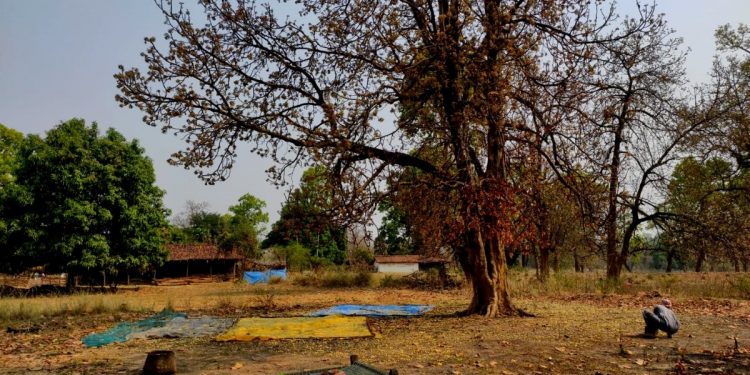Phulbani: It is 3.45 am and Srimati Mailik (49) is up and about. In less than an hour, she finishes her household chores – cleaning the house, washing clothes and preparing lunch – and sets out along with 15 other women and their children into the lush green forest surrounding her village.
Fear of snakes, insect bites and wild animals looms large all throughout the journey along the uneven path, with thick bushes engulfing both sides. For the next seven to eight hours, they will collect mahua flowers, locally called mahuli. This is what a routine day looks like for these women through the peak summer months.
“There is no fixed time when we return – at times by noon, or later. In summers, mahua collection can fetch us a good revenue if the flowers are sold at good rates,” Srimati says.
However, women of Mardigocha village in Odisha’s Kandhamal district have been gathering mahuli without any sale for the last four months. The entire collection of 21 quintals of dried flowers lie in a closed room, tightly packed in gunny sacks.
This year, they claim to have witnessed a bumper harvest. The huge supply has brought prices down by half. In the absence of a proper procurement system, they could not find genuine buyers. From last year’s Rs 40 to 50 a quintal, the prices crashed to Rs 20.
A time-sensitive produce
In most households in and around forests, women venture into the jungle to undertake the labour-intensive task of collecting minor forest produce (MFPs). “My husband works at construction sites or does odd jobs. The jungles are for us (women). We collect MFPs. We keep whatever we want for our family’s consumption and sell the rest,” says Ambika Malik, a villager.
Mahua flowers are eaten as cooked vegetables, or dried and used in bread, made into jam, mixed raw in cattle fodder, and extracted as liquor. It contributes nearly a third of the annual income of these tribal and other traditional forest-dwelling communities.
Flowers are dried for three days after collection. “They should be devoid of any moisture content. Or else, the quality dips. But due to the ongoing rains even in October, storage and drying have become a major challenge this year,” Srimati informs.
The women sell mahua flowers in the nearest market in Khajuripada town, six km from the village. “To reach there, we walk with the produce mounted on our heads for nearly three hours. There is no road to the town. We have to take an unpaved and rocky path cutting through the hill,” another villager says.
The revenue generated through the sale of mahuli is kept aside for meeting medical emergencies or for family functions. “We are unwilling to sell at a low price. But if we do not sell it on time, the quality might dip. And if we sell it at low prices, we suffer losses,” Srimati tells their tale of desperation.
No price-protection mechanism
“We spend the entire day seeking better prices. However, by the end of the day, if we are not able to sell, we agree to whatever prices the traders offer. Under any circumstances, it is not viable to carry mahuli back to the village,” says Maiti Hansdah of Sanjhili, located in the buffer zone of Similipal Tiger Reserve in Mayurbhanj district. She, along with her sister-in-law, collected two quintals of the flower this season, but are yet to sell any.
In Burudihi of Sambalpur district’s Kuchinda block, traders come to the village for procurement. “One of them bought mahua for Rs 30 per kg from five households and verbally booked a quintal from different households at the same price, saying he will return in a day to buy. Though the villagers stored away the quantity, he returned only after 20 days to offer less than Rs 20 per kg,” says Fuljensia Tete.
In some places, people are forced to barter mahua at local stores. “The flowers that I exchanged for groceries will be sold at hefty rates. Because we have not been able to sell any of it for money, we have to barter it for ration,” says Susham Nayak from Daspalla block of Nayagarh district.
The rates tend to fluctuate under the direct influence of traders, the villagers claim. The prices are generally high when the flowering starts, but it gradually dips to a bare minimum. “If there is a fixed rate which we are aware of, it will help us understand our finances better and sell the flowers accordingly. In absence of a Minimum Support Price (MSP), we continue to struggle,” Nayak adds.
Conflicting laws on procurement
Recently, mahua was included under the Centre’s ‘Mechanism for Marketing of Minor Forest Produce (MFP) through Minimum Support Price and Development of Value Chain for MFP’, making it eligible for sale under MSP. But in Odisha, the storage, possession and sale of mahua are strictly regulated under the Excise Rules, affecting the livelihood prospects of forest dwellers.
The MSP is decided by the Tribal Development Cooperative Corporation (TDCC), which functions under Odisha SC/ST Development Department. The TDCC does not procure mahua flowers because of the Excise law.
“The storage, export and sale of mahua flowers, which are used to make liquor, are regulated under the Excise policy. To avoid any overlap, mahua flowers do not come under the TDCC ambit. The same goes for many other forest products, as they conflict with certain other State or Central laws,” says Chandan Gupta, marketing manager, TDCC.
Under the State Excise Rules, “storage or possession of mahua flower shall remain open for inspection at any time by day or night by any officer of the Excise or Police Department.” Mahua has always been controlled by the State Excise laws, except for a brief period when it was nationalised in 1991. Its procurement and trading again came under existing Excise law from March 1992.
The Excise Department issues permits for collection and storage by charging a nominal licence fee. After the enactment of Non-Timber Forest Products (NTFP) Policy, 2000, the procurement and trade rights of mahua were handed over to village panchayats, but it continued to be regulated by the Excise Department under the Bihar and Orissa Excise Act, 1915, thus making illegal the storage and collection beyond a certain amount by forest-dwelling communities.
“Mahua flowers are used for various purposes, but the law defines the produce as an intoxicant. As a result, it comes under the control of the Excise Act. This contravenes the objectives of the NTFP Policy, which primarily aims at enabling the primary gatherers to earn enhanced income,” says Y Giri Rao, Executive Director of research advocacy organisation Vasundhara.
“Even the Forest Rights Act, 2006, vests the right to collect, store, process and sell the MFPs. As it is a Central law, legally it overrides the State law,” Rao explains.
“The excise policy regulates the storage of more than two quintals, for which a licence is required,” says Rama Chandra Palata, Deputy Excise Commissioner, Excise Directorate. Regarding traders, Palata says, “A lot of traders from nearby states are involved, which leads to illegal exports and lack of proper payment. Our teams keep intercepting them during their routine inspections.”
IANS/ 101Reporters






































